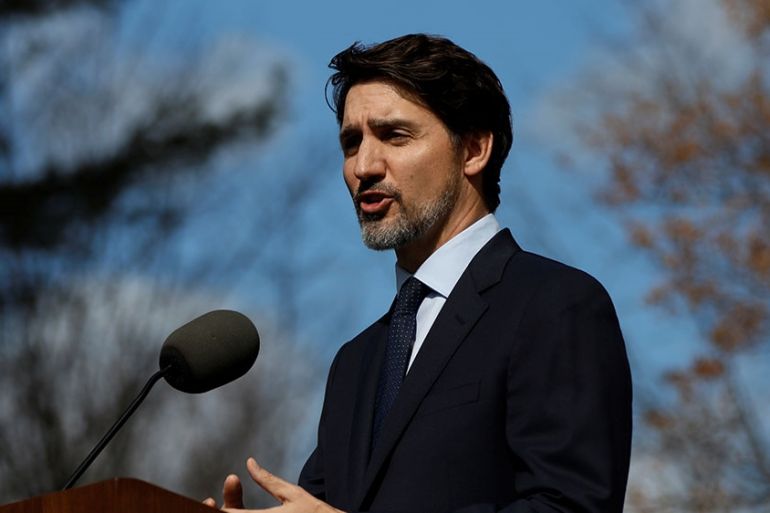US-Canadian border to be closed to ‘non-essential’ traffic
Trade, US president Donald Trump said on Twitter, would not be affected by the decree.

President Donald Trump said on Wednesday morning that the border between Canada and the United States would be closed “by mutual consent” to non-essential traffic such as tourists and other visitors.
Trade, the president said on Twitter, would not be affected by the decree. More details are forthcoming, he said.
Keep reading
list of 3 itemsUS stocks rebound 1,000 points on Trump $1 trillion stimulus plan
Morgan Stanley, Goldman join global recession chorus
We will be, by mutual consent, temporarily closing our Northern Border with Canada to non-essential traffic. Trade will not be affected. Details to follow!
— Donald J. Trump (@realDonaldTrump) March 18, 2020
Canadian Prime Minister Justin Trudeau said in a news conference outside his home on Wednesday that he spoke with Trump earlier in the day, and likened the measure to the instructions from public-health officials that people avoid visiting their neighbours unless doing so is essential.
“Travellers will no longer be permitted to cross the border for recreation and tourism,” Trudeau said.
“In both our countries, we’re encouraging people to stay home; we’re telling our citizens not to visit their neighbours unless they absolutely have to. This collaborative and reciprocal measure is an extension of that prudent approach.”
Truck drivers and Canadian snowbirds, who live in the US for part of the year and are returning to Canada, are among those expected to get an exemption. Completely closing the border would cause severe economic damage to both the US and Canada as the two economies are integrated. Much of Canada’s food supply comes from or via the US, and and 98 percent of its oil exports go to the US.
About 18 percent of American exports go to Canada. Canada relies on the US for 75 percent of its exports.
Canadian Deputy Prime Minister Chrystia Freeland said nearly 200,000 people cross the border between the two countries daily and that the traffic is a lifeline for both the Canadians and the Americans on both sides.
“We get our groceries thanks to truckers who drive back and forth across that border,” she said. “Very urgently needed medical supplies and medicines go back and forth across that border. And essential workers go back and forth across that border every day. So it is a unique relationship for Canada, and it’s important for us in handling our situation on the border to be sure that we act to get things right.”
On Monday, Trudeau announced that Canada was closing its borders to people who are not citizens or permanent residents. At the time, he said US citizens would be exempt from the ruling, but all incoming visitors would be required to self-quarantine for 14 days.
Beginning Wednesday, Canada also announced, international flights will only be accepted at four airports: Pearson Airport in Toronto, Trudeau Airport in Montreal, Vancouver International Airport and Calgary International Airport.
Robert Bothwell, a professor of Canadian history and international relations at the University of Toronto, said the government-to-government accord announced Wednesday merely ratifies what is already in place.
“Tourism in the age of the coronavirus is a contradiction in terms,” Bothwell said. “And no Canadian in his or her right mind would want to be caught with the virus on the US side of the border, given the predatory US medical pricing system.
“Actually, the insurance companies have already taken care of the problem,” he added. “Many of us have received notices that they will not pay for virus treatment south of the border.”
According to The Associated Press news agency, the Trump administration is also considering a plan to turn back all people who cross the border illegally from Mexico. The plan is under consideration and no final decisions have been made, officials told the AP.